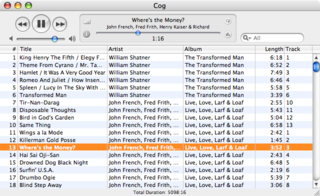 Cog 0.07 (r909) | |
| Developer(s) | Vincent Spader |
|---|---|
| Initial release | 0.01 (2005-06-02) |
| Stable release | 0.07 (December 24, 2007) [±] |
| Preview release | 0.08 (r2051) (February 7, 2013) [±] |
| Written in | Objective-C \ Cocoa |
| Operating system | macOS 10.4+ (Tiger and above) |
| Available in | Multiple Languages |
| Type | Audio player |
| License | GPL-2.0-only |
| Website | cogx.org |
Cog is an open source audio player for macOS.[1] The basic layout is a single-paned playlist interface with two retractable drawers, one for navigating the user's music folders and another for viewing audio file properties, like bitrate. Along with supporting most audio formats compatible with macOS's Core Audio API, Cog supports a wide array of other audio formats, along with their metadata, which are otherwise unsupported on macOS.[2]
In April 2006, Cog joined other Mac OS X audio software Tag and Max in an effort by the respective authors to consolidate Mac OS X open source audio software on the internet. Subsequently, the Cog website was redesigned to Tag and Max's website design, and its forums were also moved to the Tag and Max Forums.[3] In July 2007, Cog moved to its own separate forums shortly before the release of version 0.06. Last build been created in 2013.
As the original project appears to be abandoned, with the website last updated in 2008,[4] there are now several forks of the project maintained by others. In 2013,[5] Christopher Snowhill started a fork[6] and continues to maintain and develop it as of 2020. In 2015, MacRumors user Vivo made a new audio player Phonix, which is based on original Cog code.[7]
Features
General
- Last.fm support
- Growl support
- Global hotkeys
- File drawer
- Info drawer
- Smart shuffle
- Seeking
- Feedback form
- Automatic Updates (choice of Stable, Nightly, or Unstable)
Audio formats
- AIFF
- Apple Lossless
- Free Lossless Audio Codec (FLAC)
- Monkey's Audio
- MP3
- Musepack
- Ogg Vorbis
- Shorten
- WavPack
- WAV
- Video game music formats (NSF, GBS, GYM, SPC, VGM, HES, etc.)
- tracker formats (IT, S3M, XM, MOD, etc.)
- Cue sheet
Playlist formats
Metadata formats
- Vorbis comments
- ID3 v1.0, 1.1, 2.3+
- FLAC tags
- APEv1 and APEv2 tags
Languages/Localizations
Known Issues for Mac OS X v10.5 Leopard
- Playlist issues including "invisible playlist"
- Unattended cross-fade at random times
See also
References
- ^ Cog - News. Cogx.org. Retrieved on 2013-12-09.
- ^ Cog - Features. Cogx.org. Retrieved on 2013-12-09.
- ^ sbooth.org • View topic - Relationship between Play and Cog?. Forums.sbooth.org (2007-02-12). Retrieved on 2013-12-09.
- ^ https://cogx.org/
- ^ "Chris/Cog: An audio player for macOS 10.8 and newer. - README.md at 7f3da31b454f03322cb60b9b842427a0dcf20f2b - Cog - López-Snowhill". Archived from the original on 2020-03-20. Retrieved 2020-03-20.
- ^ "Cog".
- ^ macrumors.com • View topic - Phonix - Free macOS music player. Forums.macrumors.com (2015-06-18). Retrieved on 2018-06-21.
